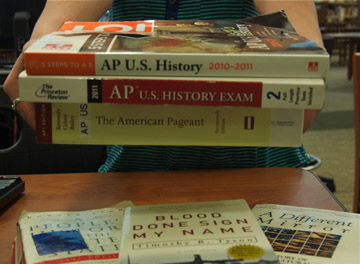
U.S. History Honors, a course originally created nine years ago by a Board of Education (BOE) directive to create more honors-level courses at Staples, is on the verge of extinction.
“I think in general, we don’t want too many levels in social studies,” James D’Amico, 6–12 Social Studies Department Coordinator, said.
D’Amico says that the department is divided when it comes to the decision to cut U.S. History Honors. In order to resolve the conflicts, D’Amico suggests a conversation between those in favor and those against the cut.
“That‘s the discussion we need to have,” D’Amico said.
According to Cathy Schager, one of three U.S. History Honors teachers, that discussion began two years ago.
“It was something Mr. D’Amico and I met and discussed because clearly it has big implications,” Schager said.
Before the honors-level class came to Staples, only two levels of U.S. History were offered: A-level and Advanced Placement (AP). The goal of switching back to the old offerings is to have a mixed-level course, including a range of student capabilities, and to offer a course for students that are truly ready for accelerated work.
“A lot of us in the social studies department at that time felt strongly about mixed-level courses. So the Honors course came inorganically in our department,” Schager said.
Although she says she has “enjoyed teaching Honors,” she’d be “happy to go back to a paradigm where we will have more mixed-level classes.”
Leveling social studies classes at all is a relatively new concept at Staples.
Until nine years ago, every student took U.S. History A. AP U.S. History is offered at almost every high school in the country, so Staples felt inclined to add the course, according to D’Amico.
But in Westport middle schools, the social studies classes are entirely unleveled, so ultimately, there are eighth grade teachers who have to decide between A, B or honors-level courses for the incoming freshmen.
“We don’t want kids labeling themselves as ‘A,’ ‘Honors’ or ‘AP.’ Those are course descriptions, not descriptions of students,” D’Amico said.
However, some students who have taken U.S. History Honors feel that if the course is eliminated, it would be at the expense of the students.
“By studying minorities throughout history, one gets an education that is more than facts, names and dates,” Charlotte Weber ’12, who took U.S. History Honors and is currently enrolled in AP U.S. History, said. “I learned history in a way I never would have.”
But with this potential change would certainly be losses.
Among those losses is the unique opportunity to learn from historical books, like “A People’s History of the United States” by Howard Zinn, “A Different Mirror” by Ronald Takaki and “Blood Done Sign My Name” by Timothy B. Tyson. These readings offer a different approach to learning.
“It’s really too bad because many of the texts that we read allow students to stretch their mind and I think that not offering them this opportunity will hinder students’ growth,” Alexis Teixiera ’13, a current U.S. History Honors student, said.
Even if the U.S. History Honors class is eliminated as an option for sophomores, there are no plans to take away U.S. History Honors/English 10 Collaborative, a class that combines U.S. History concepts with literary pieces of the time period.
“Collab stays, which makes the blow a little easier. If I were to lose both of them it would be rather devastating. It’s now a little more manageable. And I think a lot of what we do in Honors will infuse its way into A-level,” Schager said.
A proposed solution to the issue concerning sophomores in choosing an appropriate level of U.S. History is to have a section of the AP course that would be comprised of strictly sophomores. Next year, there will be an AP U.S. History pilot-program that will allow a select group of current freshmen the opportunity to take the AP history course in their sophomore year.
Nevertheless, offering that class to sophomores may lead to inevitable problems. The AP label could intimidate young students, but more likely, it could artificially increase enrollment in the class.
“In my experience, offering a course at the AP level has never deterred students from taking it,” D’Amico said.
Weber thinks that the decision will encourage “over-achievers” to take the course, regardless of their interest in U.S. History.
The differences between the three courses creates a gap in the type of learning achieved in the respective classes.
U.S. History A covers more of the core concepts of American history, while AP U.S. History teaches a curriculum that Weber says is about dead, rich men.
“For me, U.S. Honors initiated intellectual curiosity. It made the things I was learning much more three dimensional than the way topics are presented in an AP or A-level course,” Weber said.
She calls U.S. History Honors “the most interesting, most interdisciplinary class I have ever taken at Staples.”
According to Weber, this is because of the unique curriculum.
“It really shaped my high school experience,” Weber said.












































